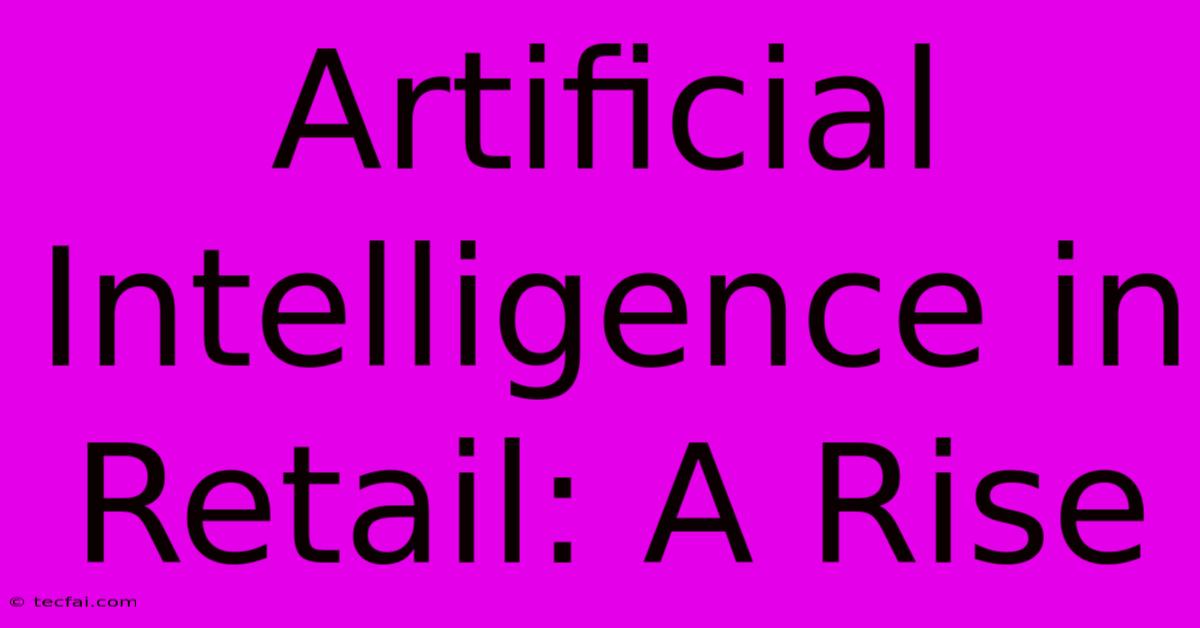Artificial Intelligence In Retail: A Rise

Discover more detailed and exciting information on our website. Click the link below to start your adventure: Visit Best Website tecfai.com. Don't miss out!
Table of Contents
Artificial Intelligence in Retail: A Rise
Artificial intelligence (AI) is rapidly transforming the retail landscape, offering unprecedented opportunities to enhance customer experience, optimize operations, and drive revenue growth. From personalized recommendations to predictive analytics, AI is no longer a futuristic concept; it's a present-day reality reshaping how businesses operate and interact with consumers. This article delves into the significant rise of AI in retail, exploring its various applications and the impact it's having on the industry.
AI-Powered Personalization: The Key to Customer Loyalty
One of the most impactful applications of AI in retail is personalized customer experiences. AI algorithms analyze vast amounts of customer data – including browsing history, purchase patterns, and demographics – to create highly targeted recommendations. This goes beyond simple "customers who bought this also bought that" suggestions. AI can predict individual customer needs and preferences, offering products and services tailored to their unique tastes. This level of personalization fosters stronger customer relationships, increasing loyalty and boosting sales.
Targeted Marketing and Increased Conversion Rates
By understanding individual customer behavior, retailers can personalize marketing campaigns, delivering the right message at the right time through the right channel. This targeted approach significantly improves conversion rates and reduces marketing waste. AI-powered email marketing, for example, can automate the creation of personalized emails, ensuring each customer receives relevant content that resonates with their interests.
Streamlining Operations with AI-Driven Efficiency
Beyond enhancing customer experiences, AI is revolutionizing retail operations, improving efficiency and reducing costs. AI-powered tools automate various tasks, from inventory management and supply chain optimization to fraud detection and customer service.
Inventory Management and Demand Forecasting:
AI algorithms analyze sales data, seasonality, and external factors to predict future demand with greater accuracy. This enables retailers to optimize inventory levels, reducing storage costs and minimizing stockouts or overstocking. Accurate demand forecasting is crucial for maintaining a competitive edge and ensuring customer satisfaction.
Automated Customer Service:
AI-powered chatbots and virtual assistants are becoming increasingly prevalent in retail, providing instant customer support 24/7. These AI-driven tools can handle routine inquiries, freeing up human agents to focus on more complex issues. This leads to improved customer service response times and increased efficiency.
The Rise of AI-Driven Retail Analytics
The ability to analyze vast datasets is another key advantage of AI in retail. AI-powered analytics provide valuable insights into customer behavior, market trends, and operational performance. Retailers can leverage these insights to make data-driven decisions, optimize pricing strategies, and improve overall business outcomes.
Predictive Analytics for Informed Decision-Making:
AI's predictive capabilities are transforming retail decision-making. By analyzing historical data and identifying patterns, retailers can anticipate future trends, optimize pricing strategies, and proactively address potential challenges. This proactive approach allows retailers to stay ahead of the competition and adapt to changing market conditions.
Challenges and Considerations in AI Adoption
While the benefits of AI in retail are undeniable, there are challenges to consider. Data privacy concerns, the cost of implementation, and the need for skilled personnel are some of the hurdles retailers face. Successfully integrating AI requires a strategic approach, careful planning, and a commitment to ongoing learning and adaptation.
The Future of AI in Retail
The future of retail is inextricably linked to AI. As AI technology continues to evolve, its applications in the retail industry will only become more sophisticated and widespread. We can expect to see further advancements in personalization, automation, and predictive analytics, leading to a more efficient, customer-centric, and profitable retail landscape. The rise of AI in retail is not just a trend; it's a fundamental shift in how businesses operate, and those who embrace this technology will be best positioned for success in the years to come.

Thank you for visiting our website wich cover about Artificial Intelligence In Retail: A Rise. We hope the information provided has been useful to you. Feel free to contact us if you have any questions or need further assistance. See you next time and dont miss to bookmark.
Featured Posts
-
Pachecos Kc Heros Welcome
Nov 30, 2024
-
The Agency Fassbender And Geres New Film
Nov 30, 2024
-
Abu Dhabi Family Irish Government Appeal
Nov 30, 2024
-
Close Irish Election Vote Counting Underway
Nov 30, 2024
-
Stoic Jets Fall To Auckland In Alm
Nov 30, 2024
